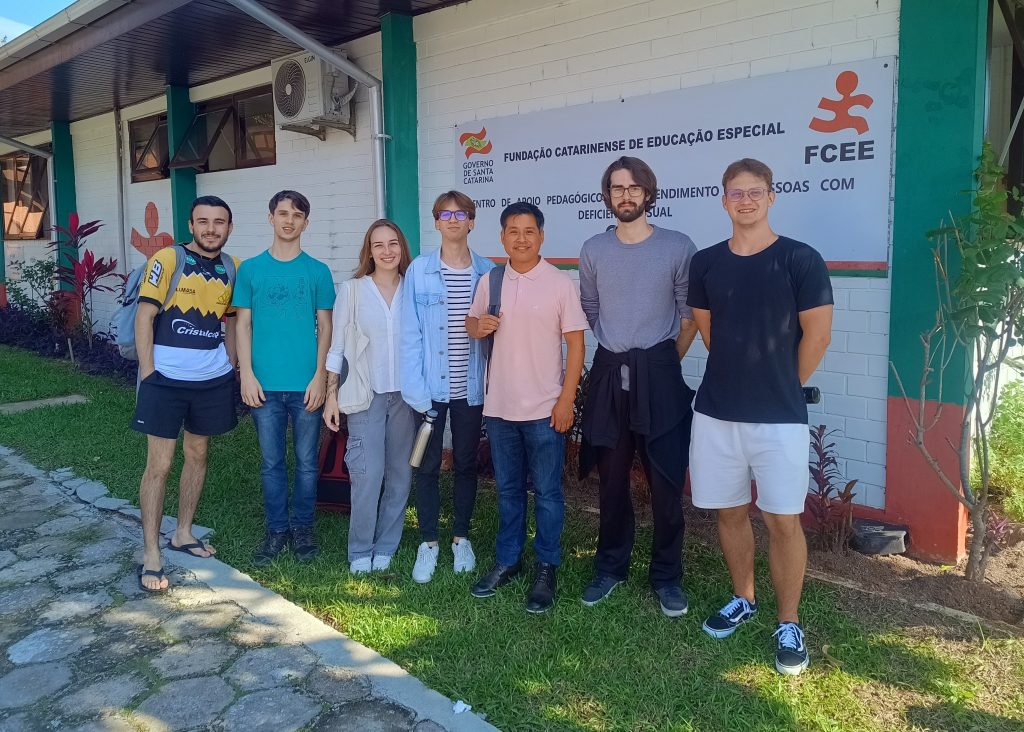Seminários Equações Diferencias e Sistemas Dinâmicos
Uma abordagem de ordem fracionária para as equações de Navier-Stokes em 2D
Juan Carlos Oyola Ballesteros (Doutorando – UFSC)
Resumo: Um dos modelos matemáticos mais renomados em dinâmica de fuidos são as equações de Navier-Stokes. Essas equações buscam determinar os campos de velocidade e pressão dentro de um uido. Elas estão entre as equações mais úteis, descrevendo a física de diversos fenômenos de interesse econômico e acadêmico. As equações de Navier-Stokes encontram aplicações na modelagem de padrões climáticos, correntes oceânicas, uxos de água em dutos, entre outros domínios. Essas equações podem ser derivadas diretamente das leis de Newton sob a suposição de incompressibilidade, onde a pressão não afeta o volume do fuido. <Continue a leitura aqui>
Data: Quinta-Feira, 05 de Dezembro de 2024, 14:00h
Local: Auditório Airton Silva, Departamento de Matemática – MTM /CFM
E. Krukoski
Tags:
2DEquações DiferenciasJuan Carlos Oyola BallesterosNavier-StokesSemináriosSistemas Dinâmicos
Visita à FCEE – Fundação Catarinense de Educação Especial
No dia 23 de maio, a turma 2024-1 do Curso de Licenciatura em Matemática da UFSC foi recebida pela equipe da Fundação Catarinense de Educação Especial. A visita é parte do curso Seminários II cujo objetivo é propiciar a oportunidade de discutir diferentes frentes relacionados à matemática e à profissão de educador.
Foram visitados os seguintes centros:
1. CENTRO DE APOIO PEDAGÓGICO PARA ATENDIMENTO ÀS PESSOAS COM DEFICIÊNCIA VISUAL – CAP
2. NÚCLEO DE ATIVIDADES DE ALTAS HABILIDADES E SUPERDOTAÇÃO – NAAHS
3. CENTRO DE TECNOLOGIA ASSISTIVA – CETEP
Foto (–>) : Salulo Minatti, Thomas Green, Júlia Felisberto, Robson Maahs, Mario Roldan, Mateus Pereira, Kevin Maron.
Tags:
FCEELicenciaturaMatemáticaSemináriosVisita Tecnica
Seminários de Otimização
Local convergence of Levenberg-Marquardt methods for nonzero-residue nonlinear least-squares problems under an error bound condition
Expositor: Douglas S. Gonçalves (UFSC)
Resumo: The Levenberg-Marquardt method (LM) is widely used for solving nonlinear systems of equations, as well as nonlinear least-squares problems. In this study, we consider local convergence issues of the LM method when applied to nonzero-residue nonlinear least-squares problems under an error bound condition, which is weaker than requiring full-rank of the Jacobian in a neighborhood of a stationary point. Differently from the zero-residue case, the choice of the LM parameter is shown to be dictated by (i)~the behavior of the rank of the Jacobian, and (ii)~a combined measure of nonlinearity and residue size in a neighborhood of the set of (possibly non-isolated) stationary points of the sum of squares function.
Data: Sexta-feira, 31 de agosto, 10h30m
Local: Auditório Airton Silva, sala MTM007 do Departamento de Matemática.
Maiores informações: www.mtm.ufsc.br/~maicon/seminar
E. Krukoski
Tags:
least-squares problemsLevenberg-MarquardtLM methodnonlinearnonzero-residueotimizaçãoSeminários
Seminários de Otimização
Método Douglas-Rachford inexato e sua complexidade de iteração (parte II)
Expositor: Marina Geremia (UFSC)
Resumo: Este trabalho propõe e explora a complexidade de iteração de um método Douglas-Rachford inexato para resolver inclusões monótonas de dois operadores. O método proposto (embora com base em um mecanismo de iteração ligeiramente diferente) é motivado pelo recente trabalho de Jonathan Eckstein e Wang Yao, no qual um método Douglas-Rachford inexato é derivado de uma instância especial do método híbrido proximal extragradiente (HPE) de Solodov e Svaiter.
Data: Sexta-feira, 14 de agosto, 10h30m
Local: Auditório Airton Silva, sala MTM007 do Departamento de Matemática.
Maiores informações: www.mtm.ufsc.br/~maicon/seminar
E. Krukoski
Tags:
Douglas-RachforditeraçãootimizaçãoSeminários
Seminários de Otimização
Método Douglas-Rachford inexato e sua complexidade de iteração
Expositor: Marina Geremia (UFSC)
Resumo: Este trabalho propõe e explora a complexidade de iteração de um método Douglas-Rachford inexato para resolver inclusões monótonas de dois operadores. O método proposto (embora com base em um mecanismo de iteração ligeiramente diferente) é motivado pelo recente trabalho de Jonathan Eckstein e Wang Yao, no qual um método Douglas-Rachford inexato é derivado de uma instância especial do método híbrido proximal extragradiente (HPE) de Solodov e Svaiter.
Data: Sexta-feira, 17 de agosto, 10h30m
Local: Auditório Airton Silva, sala MTM007 do Departamento de Matemática.
E. Krukoski
Tags:
Douglas-RachforditeraçãoMatemáticaotimizaçãoSeminários
Seminários de Equações Diferenciais
“Existence and stability of time-periodic solutions of systems of PDEs including the Navier-Stokes equations”
Palestrante: Jáuber Cavalcante de Oliveira (UFSC)
Abstract: In this seminar, we discuss recent results on the existence and stability of time-periodic solutions of systems of partial differential equations including the Navier-Stokes equations, like the work of C.-H. Hsia et al. (Numer. Math. (2017)) and a very recent result.
Data: Quinta-feira, 16 de agosto, 14h00m
Local: Sala MTM202 do Departamento de Matemática.
E. Krukoski
Tags:
Equações DiferenciaisequationsNavier-StokesPDESeminários
Seminários de Otimização
O algoritmo de Douglas-Rachford
Expositor: Maicon Marques Alves (UFSC)
Resumo: Pretendo apresentar alguns dos principais aspectos da convergência do método de Douglas-Rachford e discutir possíveis aplicações em problemas de otimização convexa e inclusões para operadores monótonos.
Data: Sexta-feira, 27 de abril, 10h30m
Local: Auditório Airton Silva, sala MTM007 do Departamento de Matemática.
Maiores informações: www.mtm.ufsc.br/~maicon/seminar
E. Krukoski
Tags:
algoritmoDouglas-RachfordotimizaçãoSeminários
Seminários de Otimização
Introdução à Programação Semidefinida (Parte 1: conceitos básicos e aplicações)
Expositor: Douglas S. Gonçalves (UFSC)
Resumo: O problema de programação semidefinida consiste em minimizar um funcional linear
sobre a intersecção de uma variedade afim com o cone das matrizes simétricas positivas semidefinidas.
Este problema tem atraído a atenção de muitos pesquisadores nas últimas décadas, sobretudo por
encontrar aplicações em diversas áreas como engenharia, otimização robusta, otimização
combinatória, mecânica quântica, entre outras.
Nesta palestra apresentarei os elementos básicos da teoria e alguns exemplos de aplicações.
Data: Sexta-feira, 13 de abril, 10h30m
Local: Auditório Airton Silva, sala MTM007 do Departamento de Matemática.
Maiores informações: www.mtm.ufsc.br/~maicon/seminar
E. Krukoski
Tags:
matrizesminimizar um funcional linearotimizaçãopositivasProgramação SemidefinidasemidefinidasSemináriossimétricas
Seminário de Matemática Aplicada
Título: Estimation of the Local Volatility from Option Data for Dupire’s PDE
Resumo: The Black-Scholes model for option pricing led to a tremendous development of trading of financial instruments in stock exchanges throughout the world. Such model provided a fair way of evaluating option prices making use of simplified assumptions. Mathematically, it consists of parabolic diffusion equation that after a suitable change of variables becomes a heat equation. Its diffusion coefficient is the volatility and describes the agitation of the market.
However, soon it was realized that the Black-Scholes model was inadequate and required realistic extensions. One of the most well-accepted of such extensions is to consider variable diffusion coefficients thus leading to the so-called Dupire’s s local volatility models. Local volatility models are extensively used and well-recognized for hedging and pricing in financial markets. They are frequently used, for instance, in the evaluation of exotic options so as to avoid arbitrage opportunities with respect to other instruments. The PDE (inverse) problem consists in recovering the time and space varying diffusion coefficient in a parabolic equation from limited data. It is known that this corresponds to an ill-posed problem.
We investigate theoretical as well as practical methods for the calibration of local Volatility models by convex regularization. Such methods can also be applied to commodities, thus being very relevant also in the accurate pricing of commodity derivatives.
We illustrate our results both with real and with simulated data. This is joint work with V. Albani (UFSC), U. Ascher (UBC), Xu Yang (IMPA).
Local: Auditório Airton Silva do Departamento de Matemática – (MTM-007 – piso térreo)
Horário: 14:00-14:45
E. Krukoski
Tags:
Dupire'sLocal VolatilityMatematica AplicadaOption DataPDESeminarioSeminários
Seminários em Análise Convexa e Otimização
Título: On the convergence rate of the scaled proximal decomposition on the graph of a maximal monotone operator (SPDG) algorithm (parte II)
Expositor: Samara Costa Lima (UFSC)
Data/Hora: Sexta-feira, 10 de novembro às 10h30m
Local: Auditório Airton Silva, Sala MTM007, do Departamento de Matemática
Maiores informações: <AQUI>
E. Krukoski
Tags:
Análise ConvexaDecompositionmonotone operatorotimizaçãoSeminários







